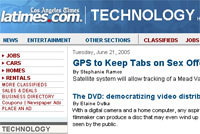 In a bold, nay brave, nay reckless move, the LA Times offered readers the chance to edit its editorials on their website via a “Wikitorial”.
In a bold, nay brave, nay reckless move, the LA Times offered readers the chance to edit its editorials on their website via a “Wikitorial”.
Floating in a fluffy cloud of philanthropy, editors at the LA Times invited readers to comment on an editorial urging a better-defined plan to withdraw troops from Iraq, suggesting the sacking of Defense Secretary Rumsfeld if those goals were not met.
The paper hoped to display the original editorial and interim versions along with the readers’ final product on their website.
“The result is a constantly evolving collaboration among readers in a communal search for truth,” glowed the paper in its Friday edition. “Or that’s the theory.”
“Wikis” – derived from the Hawaiian word for “quick – take the form of online communities where users collectively write and edit articles, with the ability to correct, override or even delete other contributors’ work.
Nearly 1,000 users eagerly registered to rewrite Friday’s lead editorial, with many offering opposing viewpoints and hyperlinks to other sites. By early Sunday morning the wiki was gone.
Within hours, one enthusiastic reader had managed to change the headline on several pages to read “F*** USA,” and in their hasty scramble to remove the offensive headline, site editors managed to simultaneously lose several readers’ comments.
 At midnight, the site managers left the doors to the candy store wide open and headed home for the night, presenting an irresistible temptation to online wagsters to do their worst, free from moderation.
At midnight, the site managers left the doors to the candy store wide open and headed home for the night, presenting an irresistible temptation to online wagsters to do their worst, free from moderation.
In the wee small hours, nefarious posters flooded the wiki with “inappropriate” posts, pornographic images and several instances of a well known picture of a man’s naughty bits.
As the porn – and complaints – rolled in, Michael Newman, deputy editor of the editorial page, found himself hauled out of bed at 4am to shut the feature down completely.
Bloodied but undaunted, managers of the newspaper’s editorial and Internet operations said they still might attempt to have another bash at online editorials written collectively by readers.
“As long as we can hit a high standard and have no risk of vandalism, then it is worth having a try at it again,” said Rob Barrett, general manager of Los Angeles Times Interactive.
Steve Outing, senior editor with the journalism think tank Poynter Institute, applauded the LA Times for its “bold experiment” adding, “That being said, I’m not at all surprised (by the problems). Wikis are pretty new, and we don’t entirely understand them and know how they are going to work out yet”.